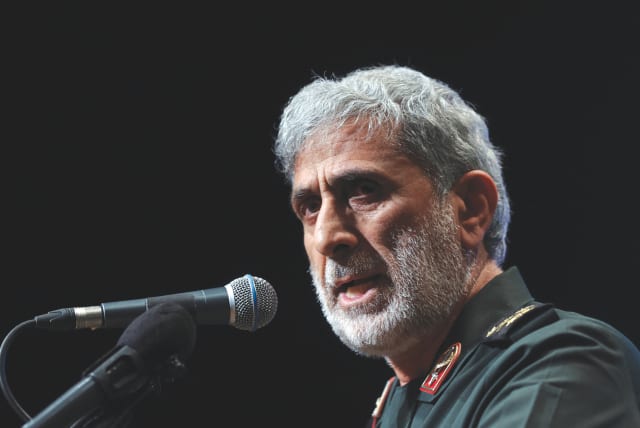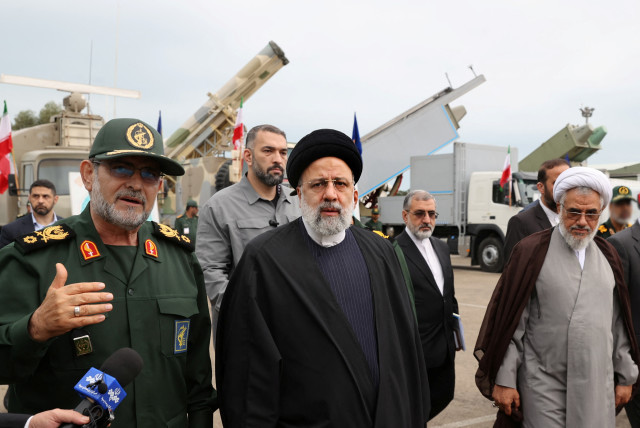What is the current, quiet conversation between US and Iran? - opinion

Media reports indicate that Iran’s proxies have stopped attacking US interests after the visit of the Revolutionary Guards Quds Force Brig.-Gen. Esmail Qaani to Baghdad.
Talk of an indirect exchange of messages and behind-the-scenes deals is nothing new in Iranian-American relations. In this context, we can understand why Iranian-backed armed factions in Iraq have stopped attacking US interests in the region, after at least 170 such events since the start of the war in Gaza, according to US statements.
Media reports indicate that Iran’s proxies have stopped attacking US interests after the visit of the Revolutionary Guards Quds Force Brig.-Gen. Esmail Qaani to Baghdad. The reports cite Iraqi and Iranian sources saying that the visit led to a halt in attacks after Qaani met with representatives of several armed factions at Baghdad airport on January 29, two days after Washington accused these factions of being behind the killing of three US soldiers at al-Burj military site in Jordan.
Since February 4, there have been no attacks on US forces in Iraq and Syria, compared with more than 20 attacks in the two weeks preceding the Quds Force commander’s visit to Iraq.
This visit not only put an end to the attacks by Iran’s proxies, it also halted US retaliation for the killing of the three soldiers, with the US limited to striking targets at facilities in Syria and Iraq, allegedly affiliated to or used by the Iranian Revolutionary Guards Corps (IRGC).
After that, US retaliation did not continue, as President Joe Biden said in his statement at the time: “Our response began today. It will continue at times and places of our choosing.”
Reading this scene, overshadowed by the rapid succession of events in the Middle East region and in the Gaza Strip in particular, several points can be made.
First, Iran is in full control of its terrorist proxies scattered across Iraq, Yemen, Lebanon, Syria, and the Palestinian territories. Its repeated rhetoric about not controlling the decisions of these factions is nothing more than a form of tactical plausible deniability and war conflict profiteering.
Iran continues denying having control
Iran repeatedly denies having any direct control over the decision-making of these factions and says that what it calls the “resistance” network in the region can be compared to the NATO alliance, according to Iranian Ambassador to the UN Amir Saeid Iravani, who also said, “We have some coordination, cooperation, consultation, and maybe some financing as well.” However, these factions have their own “choices,” when it comes to military activities.
But Qaani’s visit, which ended the factions’ attacks, is a significant indication of the limits of Iranian influence on these proxies’ decision-making. It goes beyond coordination to involve Iran’s total control over the decisions of these factions.
The scene was stage-managed quickly, in a way that not only reflected the clear limits of influence but also made clear Tehran’s desire to prevent any American headlong rush that could lead to a direct confrontation between the two parties, or at least cause Iran great embarrassment and force an escalation, which the Iranian regime definitely does not want.
It seems that Teheran has learned a lesson from the assassination of Gen. Soleimani in an American operation to which it was unable to respond in a way that corresponds to the weight of the second man in the Iranian regime, according to the current hierarchy of the system’s leaders. It therefore preferred to avoid confrontation and provocation from the US at a very sensitive moment for the White House. Iran has doubtlessly ordered the groups to stop attacking US forces, not only to avoid the aforementioned consequences but also, in my view, for another compelling reason, namely to protect these groups from stronger US attacks that could largely destroy their military infrastructure and weapons capabilities. That would result in the unraveling of Iranian influence in Iraq and Syria and the loss of billions of dollars of investment over nearly two decades.
As a result, Tehran is managing the proxy war more rationally, with other proxies, such as the Hamas terrorist movement, risking ending their existence as active players in the Middle East conflict equations for a considerable period, if not permanently.
It is also more likely that Iran’s directive to its proxies regarding de-escalation is somewhat related to the regime’s desire to create an atmosphere conducive to the completion of negotiations between Baghdad and Washington on the withdrawal of US forces from Iraq, the real objective of Iran’s overall behavior in Iraq, in particular.
Furthermore, this de-escalation comes as a reaction to the Iraqi government’s desire to curb the ruthlessness of pro-Iranian groups. Therefore, Iran’s position serves more than one purpose with a single directive.
The factional attacks may have strengthened the position of the Iraqi government, which insists on its demand for the withdrawal of US forces from Iraq and on the need to prevent the country from becoming the battleground of a proxy war.
Negotiations between Baghdad and Washington on ending US military presence in Iraq resumed a few days after the de-escalation led by Qaani and implemented by the Shi’ite factions.
In conclusion, the military escalation by Iran’s proxies in Iraq, who brandished the deceptive and misleading slogan of defending the Palestinians and working within what is described as “the axis of resistance,” was in reality part of Iran’s indirect pressure strategy aimed at withdrawing US forces from Iraq and achieving a vital and long-overdue goal in this regard.
Consequently, the current tactical calm is expected to continue until the talks between Baghdad and Washington – which are expected to last for months – produce results on this issue, unless a new variable emerges and prompts Iran to modify its position and resume pressure on the American side through its Iraqi proxies.
In any case, regional circumstances are evolving in Iran’s favor, which has succeeded, according to a report by the International Atomic Energy Agency (IAEA), in increasing the level of uranium enrichment to exceed the authorized level by 27 times. Global concerns over the Gaza war and regional unrest that can be exploited to strengthen its influence to disrupt the path to normalization and peace between Israel and Arab countries serve Iran’s interests – at least in the short term.
The writer is a UAE political analyst and former Federal National Council candidate.
Jerusalem Post Store
`; document.getElementById("linkPremium").innerHTML = cont; var divWithLink = document.getElementById("premium-link"); if (divWithLink !== null && divWithLink !== 'undefined') { divWithLink.style.border = "solid 1px #cb0f3e"; divWithLink.style.textAlign = "center"; divWithLink.style.marginBottom = "15px"; divWithLink.style.marginTop = "15px"; divWithLink.style.width = "100%"; divWithLink.style.backgroundColor = "#122952"; divWithLink.style.color = "#ffffff"; divWithLink.style.lineHeight = "1.5"; } } (function (v, i) { });

